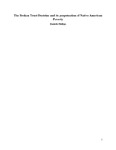| dc.rights.license | In Copyright | en_US |
| dc.creator | Phillips, Danielle A. | |
| dc.date.accessioned | 2018-04-17T11:36:16Z | |
| dc.date.available | 2018-04-17T11:36:16Z | |
| dc.date.created | 2018 | |
| dc.identifier | WLURG38_Phillips_POV_2018_A | |
| dc.identifier.uri | http://hdl.handle.net/11021/33962 | |
| dc.description | Capstone; [FULL-TEXT RESTRICTED TO WASHINGTON AND LEE UNIVERSITY LOGIN] | en_US |
| dc.description | Danielle A. Phillips is a member of the Class of 2019 of Washington and Lee University School of Law. | en_US |
| dc.description.abstract | Most Americans are unaware of the pattern of injustices that the United States government has committed against Native Americans. Native Americans are among some of the poorest in America. The United States Civil Rights Commission explains this when stating, “Native Americans still suffer higher rates of poverty, poor educational achievement, substandard housing and higher rates of disease and illness. Native Americans continue to rank at or near the bottom of nearly every social, health and economic indicator. . . . The Civil Rights Commission completed a study in 2003 and found that the federal government is responsible for this disturbing state of Native American life. One of the most fundamental and effective remedies to alleviating wealth and economic disparities is through property ownership. The ability to own property in the American economic system is essential to the acquisition of income, and building equity. The private ownership of goods, and the right to pass ones belonging to his or her heirs is a fundamental element of our country. These elements have been absent for one group of Americans for several centuries, due to government implemented programs, thus robbing Native Americans from the right to devise property to their heirs. This paper argues that one of the greatest effects on current Native American marginalization and economic disparities is tied to the Federal Indian Trust doctrine, and current government mismanagement of Indian trust property. Most economist agree that more complete property rights leads to higher incomes. Native American reservations are excellent examples of how property rights can be detrimental by policy goals. [From Introduction] | en_US |
| dc.description.statementofresponsibility | Danielle Phillips | |
| dc.format.extent | 20 pages | en_US |
| dc.language.iso | en_US | en_US |
| dc.rights | This material is made available for use in research, teaching, and private study, pursuant to U.S. Copyright law. The user assumes full responsibility for any use of the materials, including but not limited to, infringement of copyright and publication rights of reproduced materials. Any materials used should be fully credited with the source. | en_US |
| dc.rights.uri | http://rightsstatements.org/vocab/InC/1.0/ | en_US |
| dc.subject.other | Washington and Lee University, Shepherd Poverty Program | en_US |
| dc.title | The Broken Trust Doctrine | en_US |
| dc.type | Text | en_US |
| dcterms.isPartOf | RG38 - Student Papers | |
| dc.rights.holder | Phillips, Danielle A. | |
| dc.subject.fast | Indians of North America -- Legal status, laws, etc. | en_US |
| dc.subject.fast | Indians of North America -- Government relations | en_US |
| dc.subject.fast | Race discrimination | en_US |
| dc.subject.fast | Poverty | en_US |
| dc.subject.fast | Federal-Indian trust relationship | en_US |
| local.department | Shepherd Poverty Program | en_US |
| local.scholarshiptype | Capstone | en_US |
